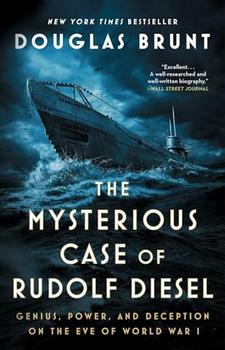Summary | Excerpt | Reviews | Beyond the Book | Readalikes | Genres & Themes | Author Bio

Genius, Power, and Deception on the Eve of World War I
by Douglas Brunt
Today, people around the world pass within a few yards of the word Diesel many times each day: written on the side of a passenger train, a marine engine, at a fueling station, or on one of the five hundred million Diesel motor vehicles traveling the roads.(1) But few know that the word refers to a person. That he started out an impoverished immigrant. That he seized a sliver of opportunity to escape London's slums. That he believed in the rigors of capitalism, and also stood for peace, equality, the artisan class, a clean environment, and humane working conditions in an era of increasing exploitation. That he believed an engineer had a dual role as both a scientist and social theorist.
Diesel's genius set him on a collision course with an emperor and a tycoon. The result of this collision changed the course of the Great War and the fate of the modern world, yet history has failed to recognize that these figures are intertwined. Four people are key to understanding the quarter century leading up to the Great War: John D. Rockefeller, Kaiser Wilhelm II, Winston Churchill, and—overlooked until now—Rudolf Diesel. By walking the paths of these men in the decades before the war and connecting facts previously thought to be unrelated, a shroud of mystery dissolves to reveal the truth about Rudolf Diesel's fate.
On September 28, 1913, the day before he disappeared, Diesel penned a letter to his wife, Martha. In his final hours before boarding the passenger ferry Dresden bound for London, he wrote "Do you feel how I love you? I would think that even from a great distance you must feel it, as a gentle quivering in you, as the receiver of a wireless telegraph machine."
One day later, Diesel was gone. While his disappearance and the eventual discovery of his body were front-page news for a time, earth-shaking events were unfolding that would push all else aside. It was the eve of a global conflict that would see thirty-two nations declare war and claim forty million casualties. Investigators ceased to pursue the peculiar actions of the players involved in Diesel's last days, the press failed to resolve the conflicting news reports in the weeks after his disappearance. The outbreak of brutal calamity only months after Diesel's presumed suicide demanded attention to the exclusion of nearly everything else. And the world forgot about Rudolf Diesel.
I. WardsAuto estimates there were 1.4 billion automobiles in the world as of 2020, approximately 35 percent of these are Diesel. This excludes off-road and heavy machinery, almost all of which are powered by Diesel.
Excerpted from The Mysterious Case of Rudolf Diesel by Douglas Brunt. Copyright © 2023 by Douglas Brunt. Excerpted by permission of Atria Books. All rights reserved. No part of this excerpt may be reproduced or reprinted without permission in writing from the publisher.
Dictators ride to and fro on tigers from which they dare not dismount. And the tigers are getting hungry.
Click Here to find out who said this, as well as discovering other famous literary quotes!
Your guide toexceptional books
BookBrowse seeks out and recommends the best in contemporary fiction and nonfiction—books that not only engage and entertain but also deepen our understanding of ourselves and the world around us.